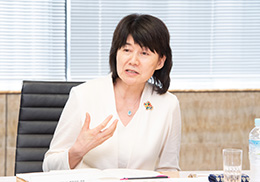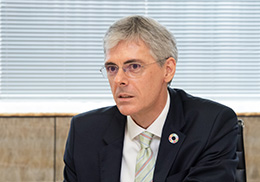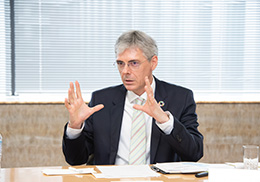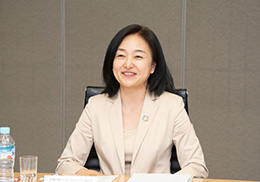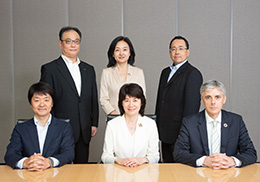Aiming “To Create Harmony with People and Nature” as stated in our corporate philosophy, our dialogue with society introduces the Suntory Group Sustainability Vision, Plastic Policy, and the Suntory Group Human Rights Policy, which were newly formulated in the course of promoting sustainability management globally, to a panel of experts for review and to hear their opinions.
-
●Date: July 22, 2019
-
●Location: Suntory World Headquarters
Experts
-

Scott T. Davis
Professor, College of Business, Rikkyo University -
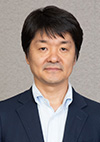
Hidemi Tomita
Director, Lloyd's Register Japan K.K. -

Kaori Kuroda
Exective Director, CSO Network Japan
Suntory
-

Tomomi Fukumoto
Executive Officer, Suntory Holdings Limited
Senior General Manager, Corporate Sustainability Division -

Nobuyasu Kitamura
Suntory Holdings Limited
Senior General Manager, Corporate Sustainability Department, Corporate Sustainability Division -

Hiroshi Naito
Suntory Holdings Limited
Senior General Manager, Corporate Sustainability Department, Corporate Sustainability Division
Moderator
Hidenori Imazu
Program Committee Member, Japan Forum of Business and Society
In Pursuit of a Vision Which Represents Suntory’s Non-Passive Nature
- Moderator
- Today, I would like to hear opinions from various perspectives regarding the sustainability management that the Suntory Group is working on globally based on its vision of “Growing for Good”. First, I would like to ask for your frank impressions and critiques about the Sustainability Vision formulated based on the seven themes that are important to the Suntory Group.
- Kuroda
- I can evaluate the selection of the four goals of “Water and Sanitation”, “Health and Welfare”, “Responsible Production and Consumption”, and “Measures to Combat Climate Change” which have been identified as SDGs to be addressed. Early on, there was an idea that it would be good to work on the 17 SDGs giving equal priority to each. However, as the SDGs are also becoming known by general society, I felt that giving an inside and outside view of what we are giving priority to is very important and provides for easy understanding. I don't think it is necessary to make forced connections with each of the SDGs when considering sustainability. Suntory has been firmly establishing environmental goals before the SDGs even came into existence. However, since the SDGs have already become a common language throughout the world, I think it is important to use them as communication tools. Although “Health and Welfare” is mentioned, the part translated as “welfare” in Japanese is “well-being” in English. When I read overseas reports, I often see the word “well-being” being used recently. It is a word that is difficult to translate into Japanese and means "happy state of being" or "purpose in life.” I think that it is connected to preserving the mental and physical health of people, in other words, a part of the culture of life where contributions are made for the realization of an enriched society where people are healthy both mentally and physically, something that Suntory has been doing for a long time.
- Tomita
- I think that Suntory’s Sustainability Vision covers themes comprehensively and strongly reflects Suntory's business activities. In particular, life culture represents a characteristic part of Suntory, and it makes me feel that enhancing both society and business at the same time is important. However, although Suntory is a company that communicates well and has a different level of message quality than other companies, the title “Sustainability Vision” seems to be too simple. Since the words “To Create Harmony with People and Nature” are a vision on their own, I would like to see such Suntory-esque expression used here as well. Also, from an ESG perspective, Suntory is highly regarded as a company that earns profits while maintaining a good relationship with society. Suntory's businesses must uses a great amount of water and agricultural products. As a result, I think it's better to clearly indicate that we are not only doing good things for climate change but also working on business continuity as well.
- Fukumoto
- Although you mentioned “Enriching life,” when formulating the Sustainability Vision we were mostly concerned with Suntory’s unique initiatives. With that, we reconfirmed that the sustainable society we are aiming for is a society where harmony is created with people and nature, which is actually our mission at Suntory. In addition to now being required to respond to SDGs and sustainability in global society, it is imperative for us to implement and pursue the philosophy that we have cherished since our founding to advance sustainability management. As a result, the Sustainability Vision has been firmly rooted in our philosophy. People demand to live fulfilled lives with quality time and purpose rather than completely devoting themselves to productivity and efficiency. When Suntory delivers soft drinks to the hands of consumers, we want to provide them with an enriched time during which they can relax and become refreshed, not just quench their thirst. During the Great East Japan Earthquake, we carried out activities to put smiles on the faces of people in disaster affected areas, such as sending musicians from Suntory Hall together with providing life support by delivering water and other needed items to disaster affected areas. “Enriching life” is a mission of ours and expresses the significance of our existence, something that we want to surely realize in our sustainability efforts.
- Davis
- Once again, I think that Suntory is blessed. Suntory has a great heritage. Although the message “Mizu To Ikiru” appears to be something to be expected, the more you read about it the more you are able to understand it. With the stance and awareness of “Mizu To Ikiru,” I thought that it was a promise that could lead to a better future thought about together with us ordinary citizen regarding how we should interact with water. On the other hand, whether such a great heritage will become a larger asset or a burden depends on what actions Suntory takes. The key to this is “Growing for Good”. From here on, I think there is a need to create an active cycle between “growing” and “good.” At first, to shift from “growing” to “good,” it is necessary to build a business model and necessary to make a unique contribution that only Suntory is capable of. Furthermore, moving from “good” to “growing” requires “social sensitivity,” in other words, efforts like this dialogue. At Suntory, however, “growing” and “good” already seem to overlap. I think that maintaining this overlap is a growth story for the future.
- Tomita
- I'm happy to hear that Mr. Davis thinks that that the Sustainability Vision is a good creation. However, it's a shame that it seems to be more of a passive stance for responding to the SDGs rather than a vision. It means that initiatives related to growth and goodness are present while conducting business activities, but in some areas this vision looks like a “good” initiatives list. I don't feel that the “innovation” that is the driving force of growth moves in tandem. Here I would like to see another step taken in a manner unique to Suntory. Recently, the “value creation model” business model is often talked about. It would be nice to see the relevance to business and integrated image as in a “value creation model.”
- Davis
- Why do consumers purchase (Mineral Water) Suntory Tennensui In Japan, consumption is based on values rather than on needs, so there is added value found in circumstances instead of things. For consumers, in addition to serving their well-being, consumption serves as a small tool for realizing expression, style, and who they want to be. There are many people who like the story of water that Suntory tells, and there is an expectation for what will be coming next. I think that part must be included in the business model and told as a main business story. Therefore, the main point of focus is the PET Sustainability Concept (described later) which is related to the recycling of PET bottles as addressed in the Plastic Policy. This is absolutely your true innovation.
- Tomita
- Originally, a vision should not focus on what can be done at the present but what is aimed for. It should have been designed as a drastic concept that deals with uncertainly and recognizes that failure to achieve goals is undesirable. As you can see as a detail, this is not a negation of the Sustainability Vision or Plastic Policy, but I would like to see more of an effort to see more of the whole story conveyed or more persuasiveness. This is because I know that Suntory can do it.
- Naito
- We have looked at very big themes which extend into the future such as the vision and business model. However, at our manufacturing sites, awareness for reducing water use and for reducing the amount of CO2 created has already been dropped. I think that we have to take a step further from here, requiring initiatives for determining how much, to what extent, and it what way reductions should be carried out. One big challenge is how to get team members to look at this. From the start, Suntory has been a company that is fond of revelry and has a long-standing corporate culture where it was established and developing before anyone knew it. I think this issue must be worked on continuously with a certain amount of tension until 2030.
- Fukumoto
- In regard to initiatives for Water Sustainability, which is one of the seven priority themes established in the Sustainability Vision, since Suntory is a company that cannot produce anything without using water, I think that there is one “Growing and Good cycle” in which resource improvement activities are carried out to sustain business in order to create wonderful water 30 years later and deliver it to consumers. In response to plastic related issues, we are also trying to innovate and take on the challenge of moving over to a completely recycling-oriented society and a decarbonized society. Despite these individual visions and initiatives, it has been pointed out that it was difficult to see the story about how to use good as a driver for growth and how to connect it to corporate value. Since seven key themes have been shared in relation to the business value chain, the next challenge is to create a story that connects with corporate value.
- Kitamura
- I think that the SDGs that have spread rapidly throughout society must be addressed as communication tools, as previously indicated. However, without entering that framework, I think that the important thing is to create a business model and story as mentioned earlier. From here on, how will Suntory operate based on the Sustainability Vision? Among various issues, there are areas were we are still in a stalemate. Therefore, we are currently searching for an attractive story in cooperation with various departments regarding how to “catch” innovation and channel it into business. We are scared that if we do not actively carry out initiatives in this way that we will not be able to establish business that connects both “growing” and “good.”
Announcement of the Plastic Policy for Changing and Exciting the World
- Moderator
- Can you provide us with a critique of the Plastic Policy which was announced in May 2019? The goal for this is to be reached by 2030, and it is an ambitious effort for the entire world to achieve it in just another 10 years. Also, Suntory has already taken the initiative in Vietnam, and together with Nestle and Coca-Cola, a corporate alliance has been created to encourage the Vietnamese government to establish a plastic recycling system.
- Tomita
- To be honest, I thought it was amazing. I knew about it as a theory, but I couldn't say anything so far because I wasn’t able to visualize it. I was able to see a path that can be realized through recycling and the use of bio-derived materials. However, in this PET Sustainability Concept (conceptual diagram) prepared today, I felt that it was a shame that I could only see that only Suntory will be working on it. I would like to see other companies and local governments in Japan and overseas also involved to show the momentum behind the initiative of changing the world. Perhaps this innovation will not be realized without such momentum. For example, we need to “resonate” in cooperation with downstream companies in recycling, and we need to resonate with consumers to create a collection system. In the end, I would like to see not only how much Suntory can contribute but also how much impact it can have on the sustainability of society as a whole involving various organizations.
- Kuroda
- I think that this Plastic Policy is wonderful. When thinking about what a sustainable society is, I think that it is to circulate what is already at the Earth’s surface. Since it is not practical to solve all the plastic issues in-house, I think it is important to get people and organizations with the technology, ideas, and policies necessary to solve each problem. By disseminating information throughout the world, we can expect the expansion of a network of people and organizations wanting to contribute to solving problems together.
- Davis
- As a single consumer, I think the efforts in Vietnam make a very good story. Furthermore, I think that buying and drinking my favorite Suntory products is an activity that I am also participating in to provide capital for the company, and I do this because Suntory is a company that I want to support. Talking to society about Plastic Policy initiatives means that it become a business model.
- Kuroda
- On the other hand, access to safe water, which Suntory has set as a goal, is still a major issue worldwide. Under such circumstances, if the world defined in this Plastic Policy is realized, access to drinking water will be greatly expanded and that basic human right will be realized.
- Davis
- I absolutely agree. Therefore, it is again necessary to reconfirm the value-added strategy for PET bottles. Since PET bottles are lightweight and durable, the right to water access has grown dramatically. Then, “Recycle” and “Reduce” are presented in the Plastic Policy first followed by “Innovation”, and an important thing is written in the final part. This is “New Behavior”, which means that it is intended for exercising rights. It means that Suntory will realize the right of people to access water, which is unimaginable. Although the Plastic Policy is a policy, it looks more like a plan in its current configuration. Since it is quite a good policy, humility, which is a Japanese virtue, is unnecessary in this case. This “New Behavior” should be the first part of the policy, followed by “Innovation.”
- Fukumoto
- Although the Target towards 2030 presented in the Plastic Policy is very ambitious, nevertheless, it was unveiled that Suntory alone would never be able to achieve it, and it was recognized that it is something that we need help with. That is why I would like to involve people who move together when given a little stimulation by making them well aware of the issue.
- Naito
- When we attempt to create lighter, thinner containers at plants, just making them lighter and thinner will cause problems such as bending while in the line and failure to be filled well. Issues like these must be dealt with. When I walk around inside plants, I continue to say that we need to care not only about saving energy and water but to sufficiently contribute to recycling and sustainability by having our designers deliver to the world what they create in the form of products. In that sense, I have reaffirmed that it is necessary to find meaning and cause in the value chain since staff at manufacturing sites are working very hard.
Expressing Suntory’s Vision Also for Human Rights
- Moderator
- Lastly, I would like to hear your ideas and opinions on the Suntory Group Human Rights Policy formulated in conjunction with the Sustainability Vision.
- Kuroda
- Today when human rights are discussed in the world, the food industry will definitely join the discussion. Particularly in Latin America, Asia, Africa, etc., the high risk of human rights violations occurring in the food supply chain is taken into account. Since the Suntory Group Human Rights Policy has been formulated, I think that Suntory can move forward with momentum. However, as an area of focus, human rights violations are likely to occur in the supply chain and production process. Therefore, I would like you give priority to initiatives that deal with this issue.
- Tomita
- For example, last year more than 50 companies issued human rights policies in Japan, and many companies have revised their human rights policies in recent years. Looking at the current situation, for example, although relief is written about, it does not extend to addressing the creation of an active problem solving mechanism. Since Suntory also manufactures coffee-based beverages, I think we have to talk about issues that coffee bean cultivation sites face. It’s a shame if we do not think about how they relate to business or ideas. In addition, there is no mention about the right for access to water. This may be because there are no issues occurring now, but isn't it the most important issue for Suntory “Mizu To Ikiru”.
- Fukumoto
- At this time, we still do not grasp secondary and tertiary supply chain risks, so we did not incorporate specific risks into the Suntory Group Human Rights Policy. However, from here on I would like to see us perform assessments at a higher level of priority.
- Davis
- I think this human rights policy is well formulated. Since such a policy was made, I would like to make one suggestion. We discussed whether this is a policy or a plan earlier, but what about creating something separately called the Suntory Human Rights Vision? For example, we have a visions for water accessibility and women's social advancement as indicated. Also, it is said that young musicians are rarely nurtured in Japan. However, Suntory has the infrastructure to nurture young musicians that no one can beat, so this is something that should also addressed through policy. I think that it is good idea to limit the human rights policy to this and to separately set out a vision of the unconventional fighting spirit that is unique to Suntory.
- Naito
- I already thought that human rights are wide ranging, including the nurturing of musicians as Mr. Davis indicated. There are also considerations at productions sites regarding working hours, what to do with holidays, and making it so that even elderly people can work. I came up with the idea that it is necessary to have a strong connection with human rights when taking action.
- Kitamura
- Thank you for your frank opinions about the Suntory Group Human Rights Policy. We are still at the stage of narrowing down content, so I would like to hear more about what you really think about it. There are various human rights related departments within the company. However, to connect human rights with the supply chain in the future, there is also the feeling as if we are headed out to new waters. Therefore, I again thought that I would like to hear opinions from various people, plan, and move forward with a fixed order of priority.
- Moderator
- In closing, I would like to find out about your expectations for Suntory.
- Tomita
- I would like to see Suntory perform top-level activities. I want to see the company actually act rather than aim and see this communicated globally. I want Suntory to aim to surprise the world audience at international conferences.
- Kuroda
- Although I think that humility is a virtue, humility is sometimes seen in the world as the same thing as not taking action. Especially in the case joint development with global companies, such companies are held to the same standards, including strict indications by international NGOs. I would like to see Suntory communicate to the world about water, the environment, and plastics more than ever before. Since human rights are also related to overall business activities, I would like Suntory to work harder in this area as well.
- Davis
- Suntory is attempting to do wonderful things, so the more I hear about, the more I expect it. I hope that the Suntory Group's promise of “Mizu To Ikiru” will include us, meaning ordinary citizens. I don't think of Suntory products as “things” but rather as indispensable resources for realizing how I want to be. I would like consumers, Suntory fans that are too humble, to express themselves more so that they do not feel unhappy. In that sense, I hope that Suntory will be able to strongly demonstrate its role as our “pilot.”
- Naito
- During today's dialogue, I found out that there are still things I haven't noticed, including perspectives and how to look at matters. I would like to move forward thinking about partnerships and what we should do when we turn awareness into action at actual manufacturing sites.
- Kitamura
- Suntory’s “Mizu To Ikiru”, “In Harmony with People and Nature”, and “Growing for Good” initiatives are going to penetrate work to a considerable degree. Today, however, after listening to everyone, I think we have to quickly reach the level where we can make these initiatives move from the independent level to the work level or workplace level. It's not about not knowing the content of words anymore but about how they will be realized. I felt strongly that in order to achieve this at the employee level we had to set goals and be aware of the time required to reach them. Once again, I was reminded that SDG No. 17 “Partnerships for the Goals” is very important and that it is something very Suntory. I really want to take action now. Thank you very much.
- Fukumoto
- Thank you very much everyone for sharing your frank opinions. Again I felt that I had to think about what value the company Suntory essentially provides to society and what it is trying to provide. A company is essentially something that grows, that is, grows by providing things that society is lacking or for solving problems. Whether it is “things” or “matters”, we will make an effort to make them sustainable after careful identification. I believe that communicating these actions properly will lead to join development, including the general public. I felt that realizing the sustainability of the Suntory Group would also lead to realizing the sustainability of the world. Above all, I was able to sense everyone’s strong expectations. If you learn about global trends and frameworks, such as sustainability and CSR, and build them yourself, you will definitely behave is a good manner. However, listening to what you have all said today, I felt that we should make full use of what we have. I would like to work towards the realization of the points to be improved and issues that were addressed today. In contrast, I want to move forward with initiatives without worry. Thank you very much for your time today.
